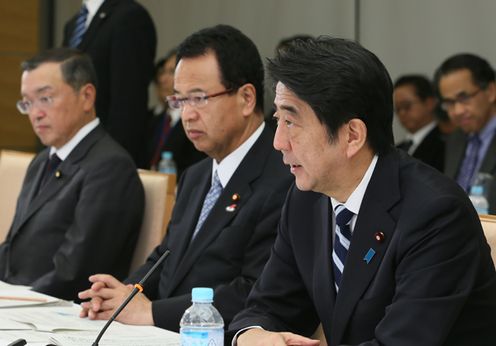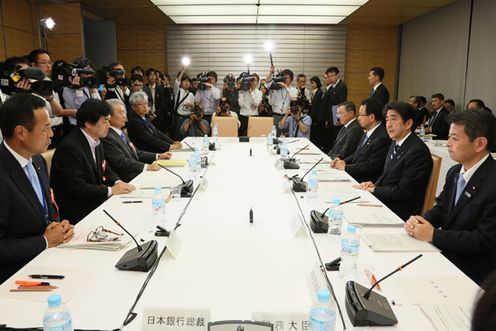Home > News > The Prime Minister in Action > October 2014 > Meeting of the Council on Economic and Fiscal Policy
Meeting of the Council on Economic and Fiscal Policy
Tuesday, October 21, 2014

Photograph of the Prime Minister delivering an address (1)

Photograph of the Prime Minister delivering an address (2)
Prime Minister Shinzo Abe held the 17th meeting of the Council on Economic and Fiscal Policy at the Prime Minister's Office.
At the meeting, “neutral tax and social systems for different ways of working for women,” “the prioritization and streamlining of expenditures (modalities of social security reform),” and “overall follow-up on the basic policies and budget” were discussed.
Taking into account the discussion, the Prime Minister made the following remarks,
“Aiming to achieve “a society in which all women shine,” the Abe Cabinet will drive forward support for child-rearing and for women’s activities to find a job after an absence from the workplace. In regard to systems and practices that have the effect of holding back the expansion of women’s work, I would like the relevant ministers to cooperate and to consider comprehensive specific measures for active participation in society by women. I also request the President of the National Personnel Authority to review the spouse allowance for civil servants.
I would like Minister Shiozaki to advance discussions on reform of the medical insurance system, including making medical costs more visible; review of the pharmaceutical price system, in particular by gaining an early grasp of the conditions of the pharmaceutical market; making nursing care reimbursements more focused and appropriate; and, through the prioritization and streamlining of the social security system, to reduce the public burden while maintaining quality; and to report on these matters to the Council by the end of the year.
Also, in regard to the overall vision of last year’s Basic Policies and budget, private-sector members have requested a follow-up and raised related issues. To achieve expenditure reform, I would like you to continue to have meaningful discussions, including on the systems involved, in order to further advance the prioritization and streamlining of expenditures.”

